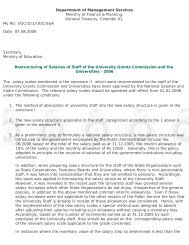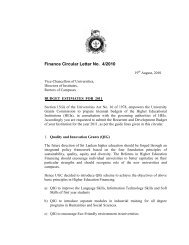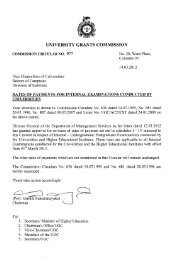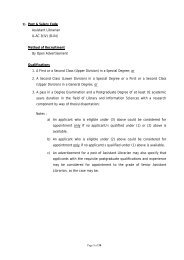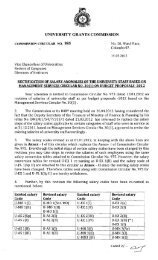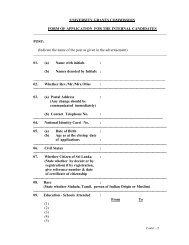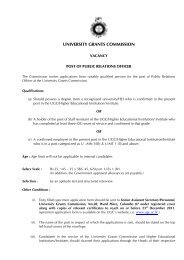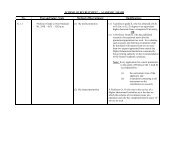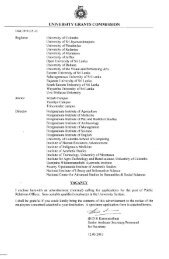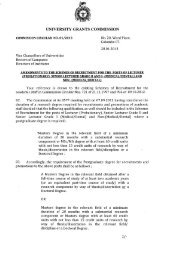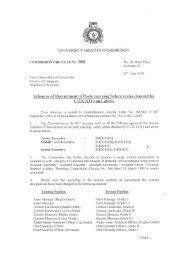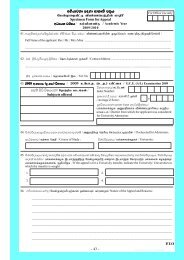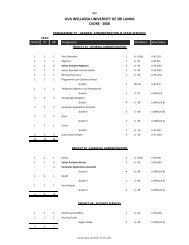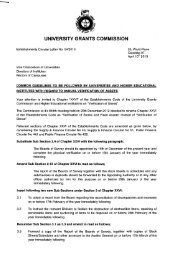Sri_Lanka_Qualifications_Framework - University Grants ...
Sri_Lanka_Qualifications_Framework - University Grants ...
Sri_Lanka_Qualifications_Framework - University Grants ...
- No tags were found...
You also want an ePaper? Increase the reach of your titles
YUMPU automatically turns print PDFs into web optimized ePapers that Google loves.
SRI LANKA<br />
QUALIFICATIONS FRAMEWORK<br />
Higher<br />
Diploma<br />
Bachelors<br />
Bachelors<br />
Hons.<br />
PG Cert.<br />
PG Dip.<br />
Diploma<br />
MA, MSc<br />
Advanced<br />
Certificate<br />
3<br />
4<br />
5 6<br />
7<br />
8<br />
MPhil, DM<br />
Certificate<br />
1<br />
2<br />
<strong>Sri</strong> <strong>Lanka</strong><br />
<strong>Qualifications</strong><br />
<strong>Framework</strong><br />
9<br />
10<br />
PhD, MD<br />
Ministry of Higher Education<br />
<strong>Sri</strong> <strong>Lanka</strong> <strong>Qualifications</strong> <strong>Framework</strong>
SRI LANKA<br />
QUALIFICATIONS FRAMEWORK<br />
Ministry of Higher Education<br />
<strong>Sri</strong> <strong>Lanka</strong> <strong>Qualifications</strong> <strong>Framework</strong>
© 2012 Ministry of Higher Education<br />
No. 18, Ward Place, Colombo 07, <strong>Sri</strong> <strong>Lanka</strong>.<br />
First Edition: June 2012<br />
Second Print: October 2012<br />
Third Print: January 2013<br />
Published by:<br />
The World Bank funded<br />
Higher Education for Twenty First Century (HETC) Project<br />
of the Ministry of Higher Education<br />
Address: 23/135, Diyawanna Gardens,<br />
Chandra Silva Mawatha,<br />
Nugegoda<br />
E-mail: ppdu@hetc.lk<br />
Web: www.hetc.lk<br />
This publication is the product of the <strong>Sri</strong> <strong>Lanka</strong> <strong>Qualifications</strong> <strong>Framework</strong> National<br />
Committee<br />
Rights and Permission:<br />
The material in this publication is copyrighted. Any part of this document may be<br />
photocopied for academic purposes.<br />
All queries should be addressed to:<br />
Deputy Director<br />
SLQF Unit of the HETC Project<br />
65/4, Kirula Road, Colombo 05, <strong>Sri</strong> <strong>Lanka</strong><br />
Fax: +94 112369032<br />
Email: ddslqf@hetc.lk<br />
Designed by:<br />
Ms. S. M. Panchali P. Bandara<br />
HETC Project<br />
ISBN 978-955-4510-00-5<br />
<strong>Sri</strong> <strong>Lanka</strong> <strong>Qualifications</strong> <strong>Framework</strong>
TABLE OF CONTENTS<br />
ABBREVIATIONS AND ACRONYMS<br />
I<br />
PROLOGUE<br />
III<br />
FOREWORD<br />
V<br />
1. INTRODUCTION 1<br />
1.1 Main Characteristics 1<br />
1.2 Origin and development 2<br />
1.3 Scope and Application 3<br />
1.4 Aims and Objectives of SLQF 3<br />
1.5 Key benefits 4<br />
2. THE FRAMEWORK 5<br />
2.1 SLQF Levels, qualifications and volumes of learning 5<br />
2.2 Definition of a credit 7<br />
3. LEVEL DESCRIPTORS 9<br />
4. NAMING OF QUALIFICATIONS 15<br />
5. QUALIFICATION DESCRIPTORS 17<br />
5.1 Certificate 17<br />
5.2 Advanced Certificate 19<br />
5.3 Diploma 21<br />
5.4 Higher Diploma 23<br />
5.5 Bachelors Degree 25<br />
5.6 Honours Bachelors Degree 27<br />
5.7 Postgraduate Certificate 29<br />
5.8 Postgraduate Diploma 31<br />
5.9 Masters Degree with Course Work 33<br />
5.10 Masters Degree 35<br />
5.11 Master of Philosophy Degree 37<br />
5.12 Doctoral Degree 39<br />
6. PROGRESSION PATHWAYS 41<br />
APPENDIX I 42<br />
APPENDIX II 46<br />
<strong>Sri</strong> <strong>Lanka</strong> <strong>Qualifications</strong> <strong>Framework</strong>
ABBREVIATIONS AND ACRONYMS<br />
A<br />
Agri<br />
AdvCert<br />
BA<br />
BAHons<br />
BBAHons<br />
BComHons<br />
BSc<br />
BScHons<br />
Cert<br />
DEd<br />
Dip<br />
DLitt<br />
DPhil<br />
DSc<br />
Env Mgmt<br />
Eng<br />
Env Sc<br />
GPA<br />
HDip<br />
HETC<br />
HND<br />
ICT<br />
IRQUE<br />
IT<br />
MA<br />
MAgri<br />
MCom<br />
Mech Eng<br />
Med<br />
MIT<br />
MLibSc<br />
MPhil<br />
MSc<br />
NQF<br />
NVQF<br />
NVQL<br />
PGCert<br />
PGDip<br />
PhD<br />
QA<br />
QAA<br />
Accountancy<br />
Agriculture<br />
Advanced Certificate<br />
Bachelor of Arts<br />
Bachelor of Arts Honours<br />
Bachelor of Business Administration Honours<br />
Bachelor of Commerce Honours<br />
Bachelor of Science<br />
Bachelor of Science Honours<br />
Certificate<br />
Doctor of Education<br />
Diploma<br />
Doctor of Letters<br />
Doctor of Philosophy<br />
Doctor of Science<br />
Environmental Management<br />
Engineering<br />
Environmental Science<br />
Grade Point Average<br />
Higher Diploma<br />
Higher Education for Twenty First Century<br />
Higher National Diploma<br />
Information and Communication Technology<br />
Improving Relevance and Quality of Undergraduate Education<br />
Information Technology<br />
Master of Arts<br />
Master of Agriculture<br />
Master of Commerce<br />
Mechanical Engineering<br />
Master of Education<br />
Master of Information Technology<br />
Master of Library Science<br />
Master of Philosophy<br />
Master of Science<br />
National <strong>Qualifications</strong> <strong>Framework</strong><br />
National Vocational <strong>Qualifications</strong> <strong>Framework</strong><br />
National Vocational <strong>Qualifications</strong> <strong>Framework</strong> Level<br />
Postgraduate Certificate<br />
Postgraduate Diploma<br />
Doctor of Philosophy<br />
Quality Assurance<br />
Quality Assurance and Accreditation<br />
Page No I<br />
<strong>Sri</strong> <strong>Lanka</strong> <strong>Qualifications</strong> <strong>Framework</strong>
QAAC<br />
Sc<br />
SLIATE<br />
SLQF<br />
SLQL<br />
SWOC<br />
TVEC<br />
UGC<br />
Quality Assurance and Accreditation Council<br />
Science<br />
<strong>Sri</strong> <strong>Lanka</strong> Institute of Advanced Technological Education<br />
<strong>Sri</strong> <strong>Lanka</strong> <strong>Qualifications</strong> <strong>Framework</strong><br />
<strong>Sri</strong> <strong>Lanka</strong> <strong>Qualifications</strong> <strong>Framework</strong> Level<br />
Strengths, Weaknesses, Opportunities and Challenges<br />
Tertiary and Vocational Education Commission of <strong>Sri</strong> <strong>Lanka</strong><br />
<strong>University</strong> <strong>Grants</strong> Commission<br />
Page No II<br />
<strong>Sri</strong> <strong>Lanka</strong> <strong>Qualifications</strong> <strong>Framework</strong>
PROLOGUE<br />
There has been a significant increase in the mobility of learners and academics in the recent<br />
past across countries and regions of the world requiring national higher education systems to<br />
support and accommodate such developments. In that light, <strong>Sri</strong> <strong>Lanka</strong> <strong>Qualifications</strong><br />
<strong>Framework</strong> (SLQF) is an important element of systems development in the higher education<br />
sector, which at the end offers a transparent and coherent framework for the learner to<br />
optimize his/her objective of learning throughout life, while at the same time improving many<br />
vital aspects of learning and assessing the learning process. However, coming out with this<br />
framework document is not the end but essentially the first step to establish and operate such<br />
a system which would possibly require suitable modifications and adaptations in the process.<br />
The establishment of SLQF will help to improve many aspects and processes in the learning<br />
and the methods of delivery enhancing the quality of education at home while at the same<br />
time it provides a clear system to develop links with higher education institutions abroad.<br />
First and foremost I take this opportunity to express my gratitude to Hon. S.B. Dissanayake,<br />
Minister of Higher Education for his guidance and support extended to make this task a<br />
success. It is a fact that his guidance and direction moved the SLQF National Committee to<br />
accomplish the task early.<br />
I also thank Hon. Nandimithra Ekanayake, Deputy Minister of Higher Education for his<br />
support and interest shown towards this task as an important system development work in the<br />
higher education sector.<br />
My sincere thanks also go to Dr. Sunil Jayantha Nawaratne, Secretary to the Ministry of<br />
Higher Education for his valuable encouragement, suggestions and support given in this<br />
regard. His support and encouragement was immensely helpful for the consultation process<br />
applied to get the views and suggestions of the university academic community.<br />
I am also grateful to the World Bank country office and the Higher Education for the Twenty<br />
First Century (HETC) Project for making arrangements to provide services of Prof. Jayantha<br />
Wijeyaratne, Deputy Director of the HETC Project as Coordinator of the SLQF National<br />
Committee.<br />
<strong>Sri</strong> <strong>Lanka</strong> <strong>Qualifications</strong> <strong>Framework</strong><br />
Page No III
I take this opportunity to express my sincere gratitude to the members of the SLQF National<br />
Committee – Prof. Gamini Samaranayake, Chairman of the <strong>University</strong> <strong>Grants</strong> Commission;<br />
Prof. S. B. S. Abayakoon, Vice Chancellor of the <strong>University</strong> of Peradeniya; Prof. Colin<br />
Peiris, Director of the QAA Council Division of the <strong>University</strong> <strong>Grants</strong> Commission; Dr T. A.<br />
Piyasiri, Director General of the Tertiary and Vocational Education Commission and Prof.<br />
Kapila C. K. Perera, Director General, <strong>Sri</strong> <strong>Lanka</strong> Institute of Advance Technological<br />
Education for their invaluable contribution and commitment to make this task a success,<br />
even compromising their job responsibilities at times. It is also my duty to place on record<br />
my appreciation of the contribution made by Prof. Jayantha Wijeyaratne as the Coordinator<br />
of the SLQF National Committee and finally bringing out this publication incorporating<br />
views and ideas expressed by all stakeholders.<br />
Finally, I sincerely thank all Vice Chancellors, Deans, Heads of Departments and all other<br />
members of the academic staff of the university system and also those who represented the<br />
non-state higher education sector for their invaluable contribution through participation at<br />
stakeholder consultation meetings and later by submitting valuable comments and<br />
suggestions to the draft document, without whose support this task could not have been<br />
accomplished as expected.<br />
P. Ranepura<br />
Chairman of the SLQF National Committee<br />
and<br />
Additional Secretary of the Ministry of Higher Education<br />
Page No IV<br />
<strong>Sri</strong> <strong>Lanka</strong> <strong>Qualifications</strong> <strong>Framework</strong>
FOREWORD<br />
The <strong>Sri</strong> <strong>Lanka</strong>n <strong>Qualifications</strong> <strong>Framework</strong> (SLQF) is a nationally consistent framework for<br />
all higher education qualifications offered in <strong>Sri</strong> <strong>Lanka</strong>. It recognizes the volume of learning<br />
of students and identifies the learning outcomes that are to be achieved by the qualification<br />
holders.<br />
SLQF comprises of ten levels and the descriptors of each of these levels are stated in a<br />
comprehensive manner. Since the volume of learning is considered in the SLQF, the number<br />
of credits that should be earned by students for each qualification is also given.<br />
With the objective of having a uniform system in naming a qualification, the designators and<br />
qualifiers of each qualification have been identified in the SLQF. The abbreviations for each<br />
qualification were also identified to maintain uniformity. The purposes and characteristics of<br />
each qualification as well as the minimum admission requirements are also stated in the<br />
SLQF.<br />
SLQF integrates the National Vocational <strong>Qualifications</strong> <strong>Framework</strong> (NVQF) developed by<br />
the Tertiary and Vocational Education Commission and the pathways of lateral mobility<br />
between the vocational education sector and higher education sector have also been<br />
identified.<br />
SLQF helps in the recognition of accredited prior learning in order to facilitate the vertical<br />
mobility within the higher education system.<br />
With the globalization of higher education, national qualifications frameworks have been<br />
developed in many countries. These have helped to evaluate the higher educational<br />
qualifications obtained from different countries. SLQF also contributes to the evaluation of<br />
qualifications obtained from overseas higher education institutions as the levels identified in<br />
this framework are based on the learning effort of the qualification holders.<br />
Until the development of SLQF there had been no mechanism to evaluate the qualifications<br />
offered by higher education institutions in <strong>Sri</strong> <strong>Lanka</strong>. SLQF will be helpful in the evaluation<br />
and recognition of qualifications offered in <strong>Sri</strong> <strong>Lanka</strong> and this will be useful to the<br />
<strong>Sri</strong> <strong>Lanka</strong> <strong>Qualifications</strong> <strong>Framework</strong><br />
Page No V
qualification holders to know the level of their qualifications. In addition, the SLQF will be<br />
helpful to the potential employers to know the level of learning and the attributes of a<br />
particular qualification holder.<br />
SLQF is useful to the higher education institutions, both in the state sector and non-state<br />
sector in designing their courses as the minimum level of learning effort required for each<br />
qualification is indicated by way of the minimum number of credits that should be earned by<br />
a qualification holder. Thus, the SLQF will contribute towards strengthening the quality of<br />
higher education qualifications offered by the universities and other higher education<br />
institutions in <strong>Sri</strong> <strong>Lanka</strong>.<br />
Prof. M. J. S. Wijeyaratne<br />
Senior Professor of Zoology, <strong>University</strong> of Kelaniya<br />
and<br />
Coordinator of the SLQF National Committee<br />
Page No VI<br />
<strong>Sri</strong> <strong>Lanka</strong> <strong>Qualifications</strong> <strong>Framework</strong>
1. INTRODUCTION<br />
1.1 Main Characteristics<br />
<strong>Sri</strong> <strong>Lanka</strong> <strong>Qualifications</strong> <strong>Framework</strong> (SLQF) is a new framework aimed at improving quality<br />
of higher education and training through recognizing and accrediting qualifications offered<br />
by different institutions. It identifies different levels to which the qualifications offered in the<br />
entire higher education sector in <strong>Sri</strong> <strong>Lanka</strong> are included. It helps to interpret qualifications<br />
and judge the relative value of a qualification. This enables the learners to make informed<br />
decisions about the qualifications they intend to acquire.<br />
SLQF helps in the comparison of different qualifications and provides a comprehensive,<br />
nationally consistent, flexible framework for all qualifications in post-secondary education<br />
and training. It combines higher education and training into a single framework and brings<br />
together the diverse higher education and training systems into a single national system.<br />
SLQF identifies the broad levels of competencies that are expected from the holders of<br />
different qualifications. The minimum entry requirements for each qualification and the<br />
possible routes of progression are also identified in the SLQF. SLQF facilitates the transfer of<br />
credits and helps in the combination of qualifications as well as progression within the higher<br />
education system. It combines school, vocational and higher education sectors in <strong>Sri</strong> <strong>Lanka</strong>.<br />
SLQF recognizes the outcomes achieved after formal secondary education. It integrates the<br />
National Vocational Qualification <strong>Framework</strong> (NVQF) developed by the Tertiary and<br />
Vocational Education Commission of <strong>Sri</strong> <strong>Lanka</strong> (TVEC) and identifies flexible pathways<br />
which assist in lateral mobility between vocational education and higher education sectors by<br />
providing basis for recognizing prior learning and credit transfer.<br />
SLQF helps in vertical mobility in higher education and encourages lifelong learning by<br />
identifying access to different qualifications. It clearly defines the avenues available for<br />
obtaining higher qualifications. It also encourages high quality vocational education and<br />
training by recognizing workplace experience which helps in national economic<br />
development. It helps in opening up learning and working opportunities irrespective of<br />
gender and age. As such, the SLQF facilitates admission to and progression within the higher<br />
education system in <strong>Sri</strong> <strong>Lanka</strong>.<br />
<strong>Sri</strong> <strong>Lanka</strong> <strong>Qualifications</strong> <strong>Framework</strong><br />
Page No 01
SLQF promotes national and international recognition of qualifications offered in <strong>Sri</strong> <strong>Lanka</strong><br />
and helps in evaluating the qualifications obtained from overseas institutions.<br />
SLQF contributes significantly towards strengthening quality assurance mechanisms of the<br />
entire higher education sector in <strong>Sri</strong> <strong>Lanka</strong>.<br />
1.2 Origin and Development<br />
The development of SLQF was initiated in 2009 with the assistance from the World Bank<br />
funded Improving Relevance and Quality of Undergraduate Education (IRQUE) Project and<br />
continued with the funding from the Higher Education for the Twenty First Century (HETC)<br />
Project. The Component 1 of the HETC project is aimed at institutionalization of norms for<br />
the higher education sector. The Subcomponent 1.1 of this component is the development of<br />
SLQF.<br />
To begin the preparatory work for the development of SLQF, a National Committee<br />
consisting of the following was appointed.<br />
A representative of the Ministry of Higher Education, nominated by the Hon. Minister<br />
of Higher Education.<br />
A representative of the <strong>University</strong> <strong>Grants</strong> Commission (UGC), nominated by its<br />
Chair.<br />
The Director General of <strong>Sri</strong> <strong>Lanka</strong> Institute of Advanced Technological Education<br />
(SLIATE) or his nominee.<br />
The Director General of TVEC.<br />
A representative of Quality Assurance and Accreditation Council (QAAC).<br />
A representative of the Committee of Vice-Chancellors and Directors (CVCD).<br />
The Committee met once a month from November 2009 and developed the SLQF<br />
documentation. In the process of development of the SLQF, four relevant models of National<br />
Qualification <strong>Framework</strong>s (NQF) from Europe, Africa and Asia Pacific were studied and a<br />
comparative SWOC analysis was carried out. The relevant NQF models studied were those of<br />
Australia, Ireland, Scotland and South Africa.<br />
Page No 02<br />
<strong>Sri</strong> <strong>Lanka</strong> <strong>Qualifications</strong> <strong>Framework</strong>
1.3 Scope and Application<br />
SLQF applies to all higher education institutions both public and private, which provide postsecondary<br />
education. Since the NVQF developed by TVEC is also integrated into SLQF, the<br />
post-secondary vocational qualifications can also be included in the framework.<br />
All higher education qualifications offered in <strong>Sri</strong> <strong>Lanka</strong> are specified in the SLQF. The SLQF<br />
indicates the designators, qualifiers, minimum credit requirements for a particular<br />
qualification as well as the minimum entry requirements.<br />
However, SLQF does not deal with the designing and offering of short term courses by any<br />
higher education institution (HEI) that will meet specific learning outcomes. These courses<br />
may be of few months duration and a certificate may be awarded on completion of such<br />
courses. Those certificates are not in line with the qualifications identified in the SLQF.<br />
1.4 Aim and Objectives of SLQF<br />
The aim of SLQF is to create an integral national framework for learning achievements by<br />
recognizing and accrediting qualifications offered by different institutions engaged in higher<br />
education and vocational training.<br />
The objectives of SLQF are to;<br />
<br />
<br />
<br />
<br />
<br />
<br />
<br />
<br />
<br />
<br />
enhance quality of higher education and training at all levels;<br />
facilitate access to higher learning and thereby contribute to full personal<br />
development of learners and to social and economic development of the country;<br />
enhance equity in higher education, training and employment opportunities;<br />
help employers to understand the levels of knowledge, skills and competencies of<br />
qualification holders;<br />
Develop positive attitudes in qualification holders;<br />
facilitate lateral and vertical mobility, and progression within higher education and<br />
career pathways;<br />
provide guidance in comparing qualifications offered by different institutions;<br />
help in developing higher education and vocational training programmes of<br />
appropriate levels;<br />
recognize prior learning; and<br />
promote lifelong learning.<br />
<strong>Sri</strong> <strong>Lanka</strong> <strong>Qualifications</strong> <strong>Framework</strong><br />
Page No 03
1.5 Key Benefits<br />
SLQF will be useful to all stakeholders of higher education including students, parents,<br />
employers, as well as education and training providers.<br />
For learners, SLQF will be useful to recognize and evaluate prior learning and identify the<br />
pathways of acquiring higher qualifications. This will enable learners to develop their full<br />
potential and thereby contribute to social and economic development of the country at large.<br />
The level descriptors given in the SLQF will be useful for employers in identifying the levels<br />
of competencies of qualification holders. It will also help in comparing the qualifications so<br />
that the supply and demand for knowledge, skills and competencies could be properly<br />
matched. Further, SLQF will be useful in comparing the qualifications offered by different<br />
institutions. This will help the employers to find the appropriate qualification holders for their<br />
business needs.<br />
SLQF describes the credit requirements for each qualification level as well as intended<br />
learning outcomes. Therefore, for higher education providers, both in the state and private<br />
sectors, the SLQF will be useful in designing their academic programmes.<br />
SLQF enables all stakeholders of post-secondary education to identify the full range of<br />
qualifications offered in the higher education system in <strong>Sri</strong> <strong>Lanka</strong> and comparable levels of<br />
vocational education and training. This helps to understand how qualifications are related to<br />
each other and how they contribute to the enhancement of knowledge and understanding, and<br />
improvement of intellectual abilities including analytical skills, evaluation skills, problem<br />
solving skills and soft skills.<br />
SLQF will also be useful to the general public to have access to appropriate lifelong<br />
education and training, which helps them to fulfill their personal as well as social and<br />
economic potential.<br />
SLQF will be useful to programme approving agencies to identify the appropriate levels of<br />
qualifications offered by different HEIs. Further, it helps in evaluating different qualifications<br />
offered by HEIs, both local and foreign, which will be useful in taking decisions in<br />
recruitment and promotion in the academic, technical and professional sectors.<br />
Page No 04<br />
<strong>Sri</strong> <strong>Lanka</strong> <strong>Qualifications</strong> <strong>Framework</strong>
2. THE FRAMEWORK<br />
2.1 SLQF Levels, <strong>Qualifications</strong> and Volumes of Learning<br />
SLQF consists of ten levels. The demand for learning outcomes and complexity of learning<br />
increase with each level.<br />
The first two levels (levels 1-2) are senior secondary level education qualifications and the<br />
next four levels (levels 3-6) are undergraduate qualifications. The other four levels (levels 7-<br />
10) are postgraduate qualifications.<br />
The levels are not directly related to the years of study except for higher research degrees.<br />
The volume of learning at each level is described in terms of credits.<br />
The level descriptors identify the learning outcomes at each level. In describing each level,<br />
degree of intellectual abilities, cognitive skills and soft skills are considered.<br />
Qualification descriptors for each level are also stated in the SLQF. Qualification descriptors<br />
give the specifications such as SLQF exit level, credit ratings, purpose and characteristics,<br />
minimum admission requirements and possible pathways of progression.<br />
Two or more qualifications are sometimes positioned at the same level. This indicates that<br />
they are broadly comparable in terms of general levels of difficulty. However, each<br />
qualification in the same SLQF level does not have the same purpose or specific learning<br />
outcomes.<br />
The comparable levels of NVQF are also identified in the SLQF.<br />
Different levels of SLQF with some examples and comparable NVQF levels are given in<br />
Table 1.<br />
The SLQF levels, the qualifications awarded at each level and the minimum credit<br />
requirement for each level are summarized in Table 2.<br />
<strong>Sri</strong> <strong>Lanka</strong> <strong>Qualifications</strong> <strong>Framework</strong><br />
Page No 05
Table 1: Different levels of SLQF with some examples together with comparable levels<br />
of NVQF<br />
[SLQL=<strong>Sri</strong> <strong>Lanka</strong> <strong>Qualifications</strong> <strong>Framework</strong> Level; NVQL=National Vocational<br />
Qualification Level]<br />
SLQL 10<br />
SLQL 9<br />
SLQL 8<br />
SLQL 7<br />
SLQL 6<br />
Doctoral Degree, MD with Board Certification<br />
Master of Philosophy, Masters by fulltime research,<br />
DM<br />
Masters with course work and a Research<br />
component<br />
Postgraduate Certificate, Postgraduate Diploma,<br />
Masters with coursework<br />
Honours Bachelors<br />
SLQL 5 Bachelors Degree, Bachelors Double Major Degree NVQL 7<br />
SLQL 4 Higher Diploma NVQL 6<br />
SLQL 3 Diploma NVQL 5<br />
SLQL 2 Advanced Certificate NVQL 4<br />
NVQL 3<br />
SLQL 1 Certificate NVQL 3<br />
NVQL 2<br />
Page No 06<br />
<strong>Sri</strong> <strong>Lanka</strong> <strong>Qualifications</strong> <strong>Framework</strong>
Table 2: Minimum requirement for each level of SLQF<br />
(SLQL = <strong>Sri</strong> <strong>Lanka</strong> <strong>Qualifications</strong> <strong>Framework</strong> Level)<br />
SLQL Qualification awarded Minimum Requirements for the<br />
SLQL 10<br />
Doctor of Philosophy / MD with<br />
Board Certification/Doctor of<br />
Letters/Doctor of Science<br />
Award<br />
Minimum 3 years of fulltime or<br />
equivalent time of original research<br />
after SLQL 6 or above<br />
SLQL 9 Master of Philosophy / DM Minimum 2 years of fulltime or<br />
SLQL 8<br />
Masters with course work and a<br />
research component<br />
equivalent time of original research<br />
after SLQL 5 or above<br />
60 credits after SLQL 5 or SLQL 6<br />
which include a research component of<br />
minimum 15 credits<br />
SLQL 7 Masters with course work 30 credits after SLQL 5 or SLQL 6<br />
Postgraduate Diploma 25 credits after SLQL 5 or SLQL 6<br />
Postgraduate Certificate 20 credits after SLQL 5 or SLQL 6<br />
SLQL 6 Honours Bachelors 120 credits after SLQL 2 or<br />
SLQL 5<br />
30 credits after SLQL 5<br />
Bachelors, Bachelors Double Major 90 credits after SLQL 2 or<br />
60 credits after SLQL 3 or<br />
30 credits after SLQL 4<br />
SLQL 4 Higher Diploma 60 credits after SLQL 2 or<br />
30 credits after SLQL 3<br />
SLQL 3 Diploma 30 credits after SLQL 2<br />
SLQL 2<br />
SLQL 1<br />
Advanced Certificate<br />
Certificate<br />
2.2 Definition of a credit<br />
In SLQF credits system, the student workload of a full time study programme is defined as<br />
1500 notional learning hours per year. Notional learning hours include direct contact hours<br />
with teachers and trainers, time spent in self learning, preparation for assignments, carrying<br />
out assignments and assessments.<br />
<strong>Sri</strong> <strong>Lanka</strong> <strong>Qualifications</strong> <strong>Framework</strong><br />
Page No 07
The minimum number of credits per course module/course unit is 1. The number of credits<br />
per course module/course unit should be indicated by integers.<br />
One credit is equivalent to 15 hours of lectures or 30-45 hours of laboratory studies or 45<br />
hours of field studies/clinical work or minimum of 90 hours of industrial training.<br />
For every one hour of lectures, a student is expected to carry out at least 2-2½ additional<br />
hours of independent learning. For every 2 hours of laboratory studies, a student is expected<br />
to carry out at least 1 additional hour of independent studies.<br />
Therefore for 1 credit in lectures, laboratory studies, field studies and clinical work, the<br />
minimum number of notional learning hours is 45-50, which also includes the time allocated<br />
for assessments. For industrial training, minimum of 90 notional learning hours including<br />
time allocated for assessments are equivalent to 1 credit.<br />
For research, minimum of 90 notional hours including time allocated for literature survey is<br />
equivalent to credit.<br />
Credits have to be earned after successful completion of the work required and appropriate<br />
assessment of learning outcomes.<br />
Page No 08<br />
<strong>Sri</strong> <strong>Lanka</strong> <strong>Qualifications</strong> <strong>Framework</strong>
3. LEVEL DESCRIPTORS<br />
The level descriptors describe the generic nature of learning achievements at each level of the<br />
SLQF. These are broad qualitative statements on intended learning outcomes of qualification<br />
holders of each level. In some SLQF levels, there are two or more qualifications. This<br />
indicates that those qualifications are more or less comparable in terms of expected general<br />
levels of learning achievements.<br />
SLQF Level 1<br />
Qualification holders of SLQF level 1 should be able to;<br />
1. demonstrate knowledge and understanding on basic principles, simple facts and ideas<br />
in a broad discipline;<br />
2. complete some routine and non-routine tasks using knowledge associated with a<br />
broad discipline;<br />
3. plan and organize new activities within a broad discipline;<br />
4. select appropriate tasks and use them effectively in a broad discipline;<br />
5. make generalizations in the areas related to a broad discipline;<br />
6. demonstrate oral and written communications skills and basic ICT skills;<br />
7. demonstrate basic skills in data gathering and numeracy; and<br />
8. carry out some routine activities under direct supervision.<br />
SLQF Level 2<br />
Qualification holders of SLQF level 2 should be able to;<br />
1. demonstrate broad knowledge and understanding of the discipline;<br />
2. apply knowledge in a practical context;<br />
3. use basic techniques and theoretical information to solve problems;<br />
4. make generalizations and draw conclusions in a broad sense;<br />
5. suggest solutions to basic problems in a broad sense;<br />
6. demonstrate skills in information gathering and numeracy;<br />
7. demonstrate oral and written communications and ICT skills;<br />
8. carry out a range of activities with direct supervision;<br />
9. exercise supervising responsibility in the implementation of routine work and manage<br />
limited resources within the area of work; and<br />
10. exercise personal responsibility in some tasks in the workplace.<br />
<strong>Sri</strong> <strong>Lanka</strong> <strong>Qualifications</strong> <strong>Framework</strong><br />
Page No 09
SLQF Level 3<br />
Qualification holders of SLQF level 3 should be able to;<br />
1. demonstrate knowledge and understanding of concepts and principles of the areas of<br />
study;<br />
2. present and interpret qualitative and quantitative data;<br />
3. develop initial arguments and make some judgments in accordance with basic theories<br />
and concepts of the areas of study;<br />
4. communicate results of studies reliably;<br />
5. undertake further training and develop new skills within a managed environment;<br />
6. demonstrate qualities and transferable skills including ICT skills necessary for<br />
employment;<br />
7. carry out a range of routine activities under guidance;<br />
8. exercise supervising responsibility in the implementation of routine work and manage<br />
limited resources within the work place; and<br />
9. exercise personal responsibility and leadership in some tasks in the work place.<br />
SLQF Level 4<br />
Qualification holders of SLQF level 4 should be able to;<br />
1. analyze and interpret qualitative and quantitative information;<br />
2. develop appropriate arguments and make judgments in accordance with basic theories<br />
and concepts of the areas of study;<br />
3. present information and ideas efficiently and effectively;<br />
4. apply knowledge and understanding of concepts and principles of the areas of study;<br />
5. undertake further training and develop new skills within a controlled environment;<br />
6. acquire competencies that help to assume predetermined responsibilities;<br />
7. demonstrate transferable skills including ICT skills necessary for employment;<br />
8. exercise personal responsibility and leadership in some tasks in the workplace; and<br />
9. demonstrate positive attitudes and social responsibility.<br />
Page No 10<br />
<strong>Sri</strong> <strong>Lanka</strong> <strong>Qualifications</strong> <strong>Framework</strong>
SLQF Level 5<br />
Qualification holders of SLQF level 5 should be able to;<br />
1. collect, analyze and interpret qualitative and quantitative data;<br />
2. demonstrate problem solving skills in the areas of study;<br />
3. develop arguments and make sound judgments in accordance with basic theories and<br />
concepts of the areas of study;<br />
4. present information, ideas and concepts efficiently and effectively;<br />
5. apply knowledge and understanding of concepts and principles of the areas of study;<br />
6. acquire new competencies that will enable them to assume major responsibilities;<br />
7. demonstrate transferable skills including ICT skills necessary for employment;<br />
8. undertake further training and develop additional skills that will enable them to make<br />
sound decisions;<br />
9. exercise initiative, personal responsibility and accountability;<br />
10. exercise leadership in the professional environment/work place; and<br />
11. demonstrate positive attitudes and social responsibility.<br />
SLQF Level 6<br />
Qualification holders of SLQF level 6 should be able to;<br />
1. demonstrate a substantive knowledge and understanding of the core aspects of the<br />
area of study;<br />
2. critically analyze data, make judgments and propose solutions to problems;<br />
3. use practical skills and enquiry efficiently and effectively within the area of study;<br />
4. construct and sustain arguments and use these arguments, ideas and techniques in<br />
problem solving;<br />
5. demonstrate awareness of the current developments in the area of study;<br />
6. engage in independent learning using scholarly reviews and secondary sources of<br />
information;<br />
7. communicate information, ideas, issues and solutions efficiently and effectively;<br />
8. exercise initiative, personal responsibility and accountability;<br />
9. undertake further training and develop additional skills;<br />
10. exercise leadership in the professional environment/work place; and<br />
11. demonstrate positive attitudes and social responsibility.<br />
<strong>Sri</strong> <strong>Lanka</strong> <strong>Qualifications</strong> <strong>Framework</strong><br />
Page No 11
SLQF Level 7<br />
Qualification holders of SLQF level 7 should be able to;<br />
1. demonstrate a substantive level of knowledge and understanding in the area of study;<br />
2. use efficiently and effectively, practical skills and enquiry within the area of study;<br />
3. critically analyze data, make judgments and propose solutions to problems;<br />
4. construct and sustain arguments and use these arguments, ideas and techniques in<br />
problem solving;<br />
5. demonstrate awareness of the current developments in the area of study;<br />
6. construct new hypotheses in the area of specializations and test them in a scientific<br />
manner;<br />
7. deal with complex issues in a systematic manner and make sound judgments;<br />
8. demonstrate self direction and confidence in solving problems;<br />
9. plan and implement tasks at professional and managerial levels;<br />
10. exercise initiative and personal responsibility;<br />
11. advance knowledge and develop additional skills; and<br />
12. carry out independent studies for professional development.<br />
SLQF Level 8<br />
Qualification holders of SLQF level 8 should be able to;<br />
1. analyze and evaluate current research in the area of specialization;<br />
2. demonstrate a critical awareness of current issues and recent developments in the area<br />
of specialization and/or area of professional practice;<br />
3. construct new hypotheses in the area of specializations and test them in a scientific<br />
manner;<br />
4. plan and implement tasks efficiently and effectively in professional, technical and<br />
academic settings;<br />
5. use efficiently and effectively, practical skills and enquiry within the area of study;<br />
6. construct and sustain arguments and use these arguments in problem solving;<br />
7. deal with complex issues systematically and make sound judgments even without<br />
complete data and communicate conclusions clearly to specialist as well as nonspecialist<br />
groups;<br />
8. demonstrate self direction and originality in tackling and solving problems;<br />
9. advance knowledge and understanding and develop additional skills;<br />
10. make decisions in complex and unpredictable contexts;<br />
Page No 12<br />
<strong>Sri</strong> <strong>Lanka</strong> <strong>Qualifications</strong> <strong>Framework</strong>
11. exercise initiative and take personal responsibility; and<br />
12. demonstrate skills of independent learning for continuous professional development.<br />
SLQF Level 9<br />
Qualification holders of SLQF level 9 should be able to;<br />
1. create new knowledge through original research of a quality that will satisfy peer<br />
review and merit publication;<br />
2. evaluate and constructively criticize and improve methodologies in the area of<br />
specialization;<br />
3. analyze and critically evaluate past and current research in the area of specialization;<br />
4. construct new hypotheses and test them in a scientific manner;<br />
5. use practical skills and enquiry efficiently and effectively within the area of study;<br />
6. supervise and guide research to generate new knowledge in the discipline;<br />
7. deal with complex issues systematically and make sound judgments and predictions;<br />
8. demonstrate self direction and originality in tackling and solving problems in the<br />
professional environment;<br />
9. plan and implement tasks efficiently and effectively in professional, technical or<br />
academic settings;<br />
10. advance knowledge and understanding and develop additional skills;<br />
11. exercise initiative and personal responsibility and make decisions in complex and<br />
unpredictable contexts; and<br />
12. demonstrate skills of independent learning for continuous professional development.<br />
SLQF Level 10<br />
Qualification holders of SLQF level 10 should be able to;<br />
1. create new knowledge through original research of a quality that makes a significant<br />
contribution to development of the discipline and satisfy peer review and merit<br />
publication;<br />
2. demonstrate critical reading and analytical skills by critically analyzing, synthesizing<br />
and evaluating data, making judgments and identifying solutions to problems;<br />
3. demonstrate a systematic acquisition and understanding of substantial amount of<br />
knowledge in the area of specialization and/or professional practice;<br />
4. conceptualize, design and implement new projects to generate new knowledge and<br />
applications;<br />
Page No 13<br />
<strong>Sri</strong> <strong>Lanka</strong> <strong>Qualifications</strong> <strong>Framework</strong>
5. respond efficiently and effectively to the changing developmental needs of the<br />
discipline;<br />
6. demonstrate a comprehensive knowledge and understanding of applicable techniques<br />
for research and advanced academic enquiry;<br />
7. supervise and guide original research to generate substantial insight in the discipline;<br />
8. make judgments on complex issues in the field of specialization even in the absence<br />
of complete data and communicate ideas and conclusions effectively to specialist and<br />
non-specialist audiences;<br />
9. identify, conceptualize and provide creative insights to complex issues and problems<br />
and demonstrate self-direction and confidence in solving problems;<br />
10. exercise high level of autonomy and initiative in professional, administrative and<br />
managerial activities;<br />
11. demonstrate leadership and originality in tackling and solving problems; and<br />
12. exercise personal judgment and responsibility in complex and unpredictable situations<br />
in professional and/or managerial environments.<br />
Page No 14<br />
<strong>Sri</strong> <strong>Lanka</strong> <strong>Qualifications</strong> <strong>Framework</strong>
4. NAMING OF QUALIFICATIONS<br />
The Qualification Type<br />
The qualification type is the first name given to a qualification. Some examples are<br />
Certificate, Advanced Certificate, Diploma, Higher Diploma, Advanced Diploma, Bachelors,<br />
Honours Bachelors, Postgraduate Certificate, Postgraduate diploma, Masters and Doctorate.<br />
The Designator<br />
The designator is the second name given to a qualification. This indicates the broad area of<br />
study or discipline. All degrees, i.e., Bachelors, Masters and Doctoral degrees have<br />
designators. The examples are Bachelor of Arts, Bachelor of Science, Master of Commerce,<br />
Doctor of Philosophy and Doctor of Science. However, designators are not used for<br />
Diplomas and Certificates. The linking word between the qualification type and designator is<br />
‘of’, which is omitted when abbreviating. E.g. BA, BSc, MCom.<br />
The Qualifier<br />
The qualifier is the third name given to a qualification. This is used to indicate the field of<br />
specialization of a qualification. The qualifier may be used in all qualification types, i.e.<br />
degrees, diplomas and certificates. The linking word between the qualifier and the<br />
qualification type or its designator, as the case may be, is ‘in‘. Some examples are Bachelor<br />
of Science Honors in Chemistry, Postgraduate Certificate in Library Science, Master of<br />
Philosophy in Environmental Science. When abbreviating, the word ‘in’ is dropped and the<br />
qualifier is placed within brackets. E.g. PGCert (Lib Sc), MPhil (Env Sc), BScHons<br />
(Chemistry).<br />
Some qualifications may include a second qualifier too. This second qualifier qualifies the<br />
first qualifier. Examples are Bachelor of Science in Engineering in Mechanical Engineering.<br />
When abbreviating both qualifiers are placed within brackets and the words ‘in’ are dropped.<br />
E.g. BSc (Eng) (Mech Eng).<br />
When there is no designator, the qualifier may follow the qualification type, E.g.<br />
Postgraduate Diploma in Environmental Management. When abbreviating, the word ‘in’ is<br />
<strong>Sri</strong> <strong>Lanka</strong> <strong>Qualifications</strong> <strong>Framework</strong><br />
Page No 15
dropped and the qualifier is placed within brackets. E.g. PGDip (Env Mgmt). The<br />
qualification types that do not have a designator may include a second qualifier too; e.g.<br />
Postgraduate Certificate in Fine Arts in Drama. Such a qualification is abbreviated as PGCert<br />
(Fine Arts) (Drama).<br />
In order to use a qualifier, at least 50% of the minimum total credits for the qualification and<br />
at least 50% of the minimum number of credits at the exit level of the qualification must be in<br />
the field of specialization denoted by the qualifier. Same applies to the second qualifier too.<br />
Page No 16<br />
<strong>Sri</strong> <strong>Lanka</strong> <strong>Qualifications</strong> <strong>Framework</strong>
5. QUALIFICATION DESCRIPTORS<br />
5.1 CERTIFICATE<br />
Specifications:<br />
SLQF Exit level: 1<br />
Minimum credits at level 1: 30<br />
Designators:<br />
Not applicable.<br />
Qualifiers:<br />
Maximum one<br />
Example: Certificate in catering<br />
Abbreviation:<br />
Cert<br />
Example: Cert (Catering)<br />
Purpose and characteristics:<br />
The purpose of this qualification is to produce a person with a basic knowledge in a<br />
discipline.<br />
This qualification is mainly vocation specific. It combines a range of simple facts and ideas<br />
with basic processes and materials. It relates theoretical knowledge to practical applications.<br />
The qualification holder should be able to complete some routine and non-routine tasks using<br />
the knowledge associated with the discipline, plan and organize new tasks, select appropriate<br />
tools and materials and use them effectively. He/she should also be able to apply a problem<br />
solving approach to deal with a situation which is directly related to the discipline, make<br />
generalization and also draw conclusions. He/she should be able to use a range of routine<br />
skills such as oral and written communication, use standard applications/processes, obtain<br />
and combine information, and use a range of numerical and graphical data in a<br />
straightforward manner. He/she should also be able to work alone or with others with<br />
minimum supervision, take responsibility in carrying out work and make a contribution to<br />
<strong>Sri</strong> <strong>Lanka</strong> <strong>Qualifications</strong> <strong>Framework</strong><br />
Page No 17
evaluation and improvement of practices and processes, and take leadership responsibility for<br />
some tasks.<br />
Minimum admission requirements:<br />
Minimum admission requirement is completion of junior secondary level, which is Grade 9<br />
or an equivalent. Completion of primary education and certified work experience equivalent<br />
to a minimum period of two years in a particular field may also be considered as an<br />
equivalent qualification for admission to SLQF level 1 provided that the applicant is at least<br />
16 years of age.<br />
Progression:<br />
Completion of SLQF Level 1 meets the minimum entry requirement for a qualification in<br />
SLQF level 2, in a particular area of specialization.<br />
Page No 18<br />
<strong>Sri</strong> <strong>Lanka</strong> <strong>Qualifications</strong> <strong>Framework</strong>
5.2 ADVANCED CERTIFICATE<br />
Specifications:<br />
SLQF Exit Level: 2<br />
Minimum credits at level 2: 30<br />
Designators:<br />
Not applicable.<br />
Qualifiers:<br />
Maximum two<br />
Examples: Advanced Certificate in Hospitality Management<br />
Advanced Certificate in Hospitality Management in Professional Cookery<br />
Abbreviation:<br />
AdvCert<br />
Examples: AdvCert (Hospitality Management)<br />
AdvCert (Hospitality Management-Professional Cookery)<br />
Purpose and characteristics:<br />
The purpose of this qualification is to produce a person with a generalized knowledge in a<br />
particular subject/area of specialization/occupation.<br />
This qualification is mainly vocation specific. It combines factual and theoretical knowledge<br />
with a range of practical applications. The qualification holder should be able to make<br />
accurate observations and apply his/her knowledge in a practical context. He/she should be<br />
able to use some basic techniques and use theoretical information in problem solving. He/she<br />
should also be able to make generalizations and predictions and also draw conclusions and<br />
suggest solutions. He/she should also possess a wide range of skills such as use of numerical<br />
and graphical data, use standard applications, and written and oral communication.<br />
The qualification holder should also be able to take responsibility for carrying out a range of<br />
activities where the overall goal is clear, without direct supervision. He/she should also be<br />
<strong>Sri</strong> <strong>Lanka</strong> <strong>Qualifications</strong> <strong>Framework</strong><br />
Page No 19
able to take some supervising responsibility, lead established teams in the implementation of<br />
routine work, manage limited resources within the areas of work, play a significant role in the<br />
evaluation of work and improvement of practices and processes and take responsibility for<br />
some tasks in the work place environment.<br />
Minimum admission requirements:<br />
Minimum admission requirement is the General Certificate of Education (Ordinary Level) or<br />
an equivalent qualification or completion of NVQF level 3.<br />
Progression:<br />
Completion of SLQF level 2 meets the minimum entry requirement for a qualification in<br />
SLQF level 3 in that particular area of specialization.<br />
Page No 20<br />
<strong>Sri</strong> <strong>Lanka</strong> <strong>Qualifications</strong> <strong>Framework</strong>
5.3 DIPLOMA<br />
Specifications:<br />
SLQF Exit level: 3<br />
Minimum credits at level 3: 30<br />
Designators:<br />
Not applicable.<br />
Qualifiers:<br />
Maximum two<br />
Examples: Diploma in Hospitality Management<br />
Diploma in Hospitality Management in Professional Cookery<br />
Abbreviations:<br />
Dip<br />
Example: Dip (Hospitality Management), Dip (Hospitality Management-Professional<br />
Cookery)<br />
Dip (Hospitality Management), Dip (Hospitality Management-Professional<br />
Cookery)<br />
Purpose and characteristics:<br />
The purpose of this qualification is to produce a person with focused knowledge and skills in<br />
a particular field for the requirement of the labour market.<br />
This qualification is basically occupational or vocational specific. It combines in-depth<br />
knowledge in a particular field with practical experience aimed at acquiring required skills in<br />
a work place. These programmes usually include simulated work experience or work<br />
integrated learning. The qualification holder should be able to make sound judgments in<br />
accordance with basic theories and concepts in their area of study. They should be able to<br />
communicate or demonstrate results accurately and reliably with coherent and structured<br />
arguments.<br />
<strong>Sri</strong> <strong>Lanka</strong> <strong>Qualifications</strong> <strong>Framework</strong><br />
Page No 21
Minimum admission requirement:<br />
Minimum admission requirement is the General Certificate of Education (Advanced level) or<br />
an equivalent qualification. A foundation course followed by passing an aptitude test or<br />
completion of NVQF level 4 or accredited work experience or accredited prior learning may<br />
also be considered as equivalent qualification for admission to SLQF level 3 in a particular<br />
field of specialization.<br />
Progression:<br />
Completion of SLQF level 3 meets the minimum entry requirement for a qualification in<br />
SLQF level 4 in that particular field of specialization.<br />
Page No 22<br />
<strong>Sri</strong> <strong>Lanka</strong> <strong>Qualifications</strong> <strong>Framework</strong>
5.4 HIGHER DIPLOMA<br />
Specifications:<br />
SLQF Exit level: 4<br />
Minimum Total credits: 60<br />
Minimum credits at level 4: 30<br />
Designators:<br />
Not applicable.<br />
Qualifiers:<br />
Specific, maximum one<br />
Example: Higher Diploma in Accountancy<br />
Higher Diploma in Information Technology<br />
Abbreviations:<br />
HDip<br />
Example: HDip (A), HDip (IT)<br />
Purpose and Characteristics:<br />
The purpose of this qualification is to offer an intensive, focused education in a particular<br />
area of specialization to meet the requirements of the labour market.<br />
The qualification holders should have a deep understanding of theory, practice, relevant<br />
methodology and recent developments in a particular area of study. They should be able to<br />
apply the concepts and principles in the area of study, analyze information and suggest<br />
solutions to problems in an employment context.<br />
They should also be able to communicate the results of analysis and arguments to specialist<br />
and non-specialist audiences successfully. They should be capable of carrying out further<br />
training and acquire new competencies which will help to enhance their capacity to bear<br />
responsibilities.<br />
<strong>Sri</strong> <strong>Lanka</strong> <strong>Qualifications</strong> <strong>Framework</strong><br />
Page No 23
They should display qualities and transferable skills as well as subject specific skills<br />
necessary for employment, carry out further training and manage their own learning.<br />
Minimum admission requirements:<br />
Minimum admission requirement is the General Certificate of Education (Advanced level) or<br />
an equivalent qualification and completion of a minimum of 30 credits at SLQF Level3.<br />
Completion of NVQF level 5 may also be considered as an equivalent qualification in that<br />
field of specialization.<br />
Progression:<br />
Completion of Higher Diploma meets the minimum requirement for admission to SLQF level<br />
5.<br />
Page No 24<br />
<strong>Sri</strong> <strong>Lanka</strong> <strong>Qualifications</strong> <strong>Framework</strong>
5.5 BACHELORS DEGREE<br />
Specifications:<br />
SLQF Exit level: 5<br />
Minimum total credits: 90<br />
Minimum credits at level 5: 30<br />
Designators:<br />
Bachelors degree designators are limited to broad areas of study and disciplines. Some<br />
examples are Bachelor of Arts and Bachelor of Science<br />
Qualifiers:<br />
Maximum two<br />
Examples: Bachelor of Arts in Peace and Conflict Resolution<br />
Bachelor of Science in Environmental Management<br />
Abbreviations:<br />
Examples: BA, BSc, BA (Peace and Conflict Resolution), BSc (Env Mgmt)<br />
Purpose and Characteristics:<br />
The purpose of this qualification is to prepare a graduate with a broad knowledge on theory<br />
and methodology of disciplines that enable them to bear responsibility in an academic or<br />
professional environment. The qualifications holders should know about the well established<br />
principles in their fields of study and should also be able to apply them where appropriate.<br />
Further, they should be able to use established techniques to initiate and undertake analysis of<br />
information and to propose solutions to problems. They should also be able to communicate<br />
information effectively to specialist and non-specialist audiences and use key techniques of<br />
the discipline. They should be able to carry out further training, acquire new competencies,<br />
display qualities and skills necessary for employment and exercise personal responsibility in<br />
decision making.<br />
Minimum admission requirement:<br />
Minimum admission requirement is the General Certificate of Education (Advanced level) or<br />
<strong>Sri</strong> <strong>Lanka</strong> <strong>Qualifications</strong> <strong>Framework</strong><br />
Page No 25
an equivalent qualification and completion of at least 60 credits of SLQF levels 3 and 4 with<br />
a minimum of 30 credits at SLQF Level 4 or equivalent. Completion of NVQF level 6 may<br />
also be considered as an equivalent qualification for admission in that field of specialization.<br />
Progression:<br />
Completion of Bachelor General degree meets the minimum entry requirement for admission<br />
to SLQF levels 7 and/or 8. If the qualification holder obtains a minimum GPA of 3.0 in the<br />
scale of 0-4, he/she may be considered for admission to SLQF level 9 on successful<br />
completion of a M.Phil Qualifying examination which will be conducted after completion of<br />
30 credits equivalent to those of SLQF level 6 in the same or a related subject.<br />
A qualification shall not be awarded for early exit from SLQF level 5. However, a Diploma<br />
or a Certificate may be awarded for those completing the requirements equivalent to SLQF<br />
Levels 4 or 3 respectively.<br />
Page No 26<br />
<strong>Sri</strong> <strong>Lanka</strong> <strong>Qualifications</strong> <strong>Framework</strong>
5.6 HONOURS BACHELORS DEGREE<br />
Specifications:<br />
SLQF Exit Level: 6<br />
Minimum total credits: 120<br />
Minimum credits at level 6: 30<br />
Designators:<br />
Honours Bachelors Degree designators are specific and are limited to broad generic areas of<br />
discipline or study. Some examples are Bachelor of Arts Honours, Bachelor of Commerce<br />
Honours, Bachelor of Business Administration Honours and Bachelor of Science Honours.<br />
Qualifiers:<br />
Maximum two<br />
Examples: Bachelor of Science Honours in Engineering in Mechanical Engineering<br />
Bachelor of Arts Honours in Sociology, Bachelor of Science Honours in<br />
Chemistry.<br />
Abbreviations:<br />
Examples: BScHons (Eng) (Mech Eng), BScHons (Chemisty), BAHons (Archaeology),<br />
BAHons, BScHons, BComHons, BBAHons<br />
Purpose and Characteristics:<br />
The main purpose of this qualification is to prepare students for research based postgraduate<br />
studies. This qualification helps to consolidate and strengthen the student’s knowledge in a<br />
particular discipline and to develop research capacity and skills in that discipline. This<br />
qualification demands high level of theoretical engagement as well as high intellectual<br />
independence. Further, these programmes must include a research project in the field of<br />
specialization carried out under the guidance and supervision of a qualification holder of<br />
level 8, 9 or 10 and reporting in a manner of a dissertation, which will be assessed. The<br />
research component should not be less than 8 credits of SLQF level 6. In some areas,<br />
Bachelors Special degrees are recognized by an appropriate professional body.<br />
Another purpose of this qualification is to provide a broad education that equips graduates<br />
with knowledge, methodology and skills in a particular discipline that enables them to obtain<br />
<strong>Sri</strong> <strong>Lanka</strong> <strong>Qualifications</strong> <strong>Framework</strong><br />
Page No 27
license from appropriate professional bodies in order to demonstrate responsibility in a<br />
professional manner.<br />
They should also be able to construct and sustain arguments and solve problems using<br />
appropriate ideas and techniques in a professional context.<br />
The qualification holders should be able to demonstrate thorough and systematic<br />
understanding of core aspects of the subject of study. They should also have an ability to<br />
accurately use the established techniques of analysis within that discipline.<br />
They should be able to clearly communicate information, ideas, issues, problems and<br />
solutions to specialist as well as non-specialist audiences. They should also be able to<br />
exercise initiative, identify situations where support is needed, carry out further training and<br />
manage own learning.<br />
Minimum admission requirements:<br />
Minimum admission requirement is the General Certificate of Education (Advanced level) or<br />
an equivalent qualification and completion of 90 credits at SLQF Levels 3, 4 and 5 with a<br />
minimum of 15 credits at SLQF Level 5 in the relevant field. Completion of NVQF level 7<br />
may also be considered as an equivalent qualification for admission in that field of<br />
specialization.<br />
Progression:<br />
Completion of Honours Bachelors Degree meets the minimum entry requirement for<br />
admission to SLQF levels 7 and/or 8,<br />
or<br />
to SLQF level 9 or 10 after successful completion of a qualifying examination. If the<br />
qualification holder possesses a minimum GPA of 3.0 in a scale of 0-4, even without a<br />
qualifying examination he/she may be admitted to SLQF level 9 or 10.<br />
Bachelors degree of level 5 may be awarded for early exit from Bachelors Honours Degree<br />
programme provided that the candidate has completed minimum of 30 credits in levels 5<br />
and/or 6. However, in professional disciplines a qualifications may not be awarded for early<br />
exit.<br />
Page No 28<br />
<strong>Sri</strong> <strong>Lanka</strong> <strong>Qualifications</strong> <strong>Framework</strong>
5.7 POSTGRADUATE CERTIFICATE<br />
Specifications:<br />
SLQF Exit Level: 7<br />
Minimum total credits at level 7: 20<br />
Designators:<br />
Not applicable.<br />
Qualifiers:<br />
Maximum two<br />
Examples: Postgraduate Certificate in Natural Resources Management,<br />
Postgraduate Certificate in Fine Arts in Drama<br />
Abbreviations:<br />
PGCert, PGCert (Natural Resources Management), PGCert (Fine Arts) (Drama)<br />
Purpose and Characteristics:<br />
Purpose of this qualification is to enhance the capacity of a person with an advanced<br />
knowledge in a specific field of study or discipline to enable working graduates/holders of<br />
professional qualifications to advance their knowledge in a particular field of study.<br />
The qualification holders should be able to demonstrate clear understanding of theoretical<br />
knowledge together with critical awareness of current issues in the subject area. They should<br />
also be able to deal with complex issues systematically and make sound judgments and<br />
communicate decisions clearly to others. They should demonstrate self-direction in tackling<br />
and solving problems and be able to plan and implement tasks in a professional manner.<br />
This qualification demands a high level of theoretical engagement and does not involve<br />
conducting a research project or an independent study.<br />
Minimum admission requirement:<br />
Minimum admission requirement is a Bachelors degree with 30 credits in the relevant subject<br />
area or equivalent prior learning experience and/or a qualification in the relevant subject area.<br />
<strong>Sri</strong> <strong>Lanka</strong> <strong>Qualifications</strong> <strong>Framework</strong><br />
Page No 29
Completion of NVQF level 7 may also be considered as an equivalent qualification for<br />
admission to SLQF level 7 in that field of specialization.<br />
Progressions:<br />
Completion of Postgraduate Certificate meets the entry requirements to Postgraduate<br />
Diploma and/or Masters degree of SLQF levels 7 in the same field of specialization.<br />
Page No 30<br />
<strong>Sri</strong> <strong>Lanka</strong> <strong>Qualifications</strong> <strong>Framework</strong>
5.8 POSTGRADUATE DIPLOMA<br />
Specifications:<br />
SLQF exit level: 7<br />
Minimum total credits at level 7: 25<br />
Designators:<br />
Not applicable.<br />
Qualifiers:<br />
Maximum two.<br />
Examples: Postgraduate Diploma in Education, Postgraduate Diploma in Environmental<br />
Science, Postgraduate Diploma in Crop Science, Postgraduate Diploma in<br />
Fine Arts in Drama<br />
Abbreviations:<br />
PGDip (Education), PGDip (Env Sc), PGDip (Crop Sc) PGDip (Fine Arts)(Drama)<br />
Purpose and characteristics:<br />
Purpose of this qualification is to enhance the capacity of a person with an advanced<br />
knowledge in a specific field of study or discipline to enable working graduates/holders of<br />
professional qualifications to advance their knowledge in that field of specialization to<br />
provide an entry point for further education and an advanced qualification for holders of<br />
recognized qualifications from professional bodies/institutions.<br />
The qualification holders should be able to demonstrate clear understanding of theoretical<br />
knowledge together with critical awareness of current issues in the subject area and apply<br />
techniques relevant to their professional practice/chosen field of study. They should also be<br />
able to deal with complex issues systematically and creatively, and make sound judgments<br />
and communicate decisions clearly to others. They should demonstrate self-direction and<br />
originality in tackling and solving problems and be able to plan and implement tasks<br />
independently in a professional manner.<br />
<strong>Sri</strong> <strong>Lanka</strong> <strong>Qualifications</strong> <strong>Framework</strong><br />
Page No 31
This qualification demands a high level of theoretical engagement. It may not require<br />
conducting a research project but require conducting some independent studies.<br />
Minimum admission requirement:<br />
Minimum admission requirement is a Bachelors degree with 30 credits in the relevant subject<br />
area or equivalent prior learning experience and/or a qualification in the relevant subject area.<br />
Completion of NVQF level 7 may also be considered as an equivalent qualification for<br />
admission to SLQF level 7 in that field of specialization.<br />
Progression:<br />
Completion of Postgraduate Diploma meets the entry requirements to SLQF level 8. A<br />
qualification shall not be awarded for early exit from this level. However, a postgraduate<br />
certificate may be awarded for those who are completing 20 credits of theoretical engagement<br />
at SLQF Level 7.<br />
Page No 32<br />
<strong>Sri</strong> <strong>Lanka</strong> <strong>Qualifications</strong> <strong>Framework</strong>
5.9 MASTERS DEGREE WITH COURSE WORK<br />
Specifications:<br />
SLQF exit level: 7<br />
Minimum total credits at level 7: 30<br />
Designators:<br />
Masters degree designators are limited to specific areas of study. Examples include Master of<br />
Information Technology, Master of Linguistics, Master of Library Science etc.<br />
Qualifiers:<br />
Not applicable.<br />
Abbreviations:<br />
MIT, MLinguistics, MAgri, MLibSc<br />
Purpose and characteristics:<br />
Purpose of this qualification is to develop a person with an advanced knowledge in a specific<br />
field of study or discipline to enable working professionals to advance their knowledge in that<br />
field of specialization.<br />
The qualification holders should be able to demonstrate thorough understanding together with<br />
critical awareness of current issues in their subject area and apply techniques relevant to their<br />
professional practice. They should also be able to deal with complex issues systematically<br />
and creatively and make sound judgments and communicate decisions clearly to others. They<br />
should demonstrate self-direction and originality in tackling and solving problems and be<br />
able to plan and implement tasks at professional levels.<br />
This qualification demands a high level of theoretical engagement and a guided independent<br />
study equivalent to a minimum of 5 credits.<br />
Any Bachelors degree with a minimum of 150 credits or a minimum student workload of<br />
7500 notional learning hours, encompassing professional practice spanning over several<br />
levels starting from SLQF level 3, and accredited by a recognized Accreditation Agency may<br />
<strong>Sri</strong> <strong>Lanka</strong> <strong>Qualifications</strong> <strong>Framework</strong><br />
Page No 33
e included in SLQF level 7, provided that the final outcome of the qualification meets the<br />
descriptors of SLQF level 7.<br />
Minimum admission requirement:<br />
Minimum admission requirement is a Bachelors degree with 30 credits in the relevant subject<br />
area or equivalent accredited prior learning experience and/or a qualification in the relevant<br />
subject area. Completion of NVQF level 7 may also be considered as an equivalent<br />
qualification for admission to SLQF level 7 in that field of specialization<br />
Progression:<br />
Completion of Masters Degree meets the entry requirement to SLQF level 8 or 9 in the same<br />
field of specialization.<br />
A Postgraduate Diploma or a Postgraduate Certificate may be awarded for those who exit<br />
early completing 25 credits or 20 credits respectively.<br />
Page No 34<br />
<strong>Sri</strong> <strong>Lanka</strong> <strong>Qualifications</strong> <strong>Framework</strong>
5.10 MASTERS DEGREE<br />
Specifications:<br />
SLQF exit level: 8<br />
Minimum total credits: 60 (45 for course work +15 for research)<br />
Minimum total credits at Level 8: 30 (Minimum of 15 for research)<br />
Designators:<br />
Masters degree designators are specific and limited to broad generic areas of discipline or<br />
profession. The examples include Master of Science, Master of Arts, Master of Commerce,<br />
Master of Education, Master of Business Administration, etc.<br />
Qualifiers:<br />
Maximum one<br />
Examples: Master of Arts in Sinhala. Master of Science in Environmental Science<br />
Abbreviations:<br />
Examples: MA, MCom, MEd, MA (Sinhala), MSc, MSc (Environmental Science)<br />
Purpose and characteristics:<br />
The purpose of this qualification is to advance knowledge of a graduate or professional in a<br />
specific field of study and to prepare graduates for higher degrees and specialized<br />
professional employment.<br />
This qualification should be earned by completing course work aggregating to a minimum of<br />
30 credits at SLQF level 7 or 8 and a research project with notional learning hours totaling to<br />
a minimum of 15 credits. The research should be carried out under the guidance of a<br />
supervisor holding an equivalent or a higher qualification and should make an original<br />
academic contribution to a particular discipline. The candidate should submit a dissertation<br />
which is evaluated and accepted.<br />
The qualification holder must be able to deal with complex issues systematically and<br />
creatively and make sound judgments and communicate decisions clearly to specialist and<br />
<strong>Sri</strong> <strong>Lanka</strong> <strong>Qualifications</strong> <strong>Framework</strong><br />
Page No 35
non-specialist groups. He/she should demonstrate self-direction and originality in tackling<br />
and solving problems and be able to plan and implement tasks in a professional manner.<br />
The qualification holder should also be able to demonstrate critical awareness of current<br />
issues in the subject area and be able to apply techniques relevant to profession/area of<br />
specialization.<br />
Minimum admission requirements:<br />
Minimum admission requirement is a Bachelors degree with a minimum of 30 credits in the<br />
relevant subject area or a qualification of SLQF level 6 or 7 in the relevant area of study.<br />
Completion of NVQF level 7 with a minimum GPA of 3.0 at a scale of 0-4 may also be<br />
considered as equivalent qualification for admission to SLQF level 8 in that field of<br />
specialization<br />
Progression:<br />
Completion of SLQF level 8 meets the entry requirement to MPhil degree in the same field of<br />
specialization. Early exit from this level is possible provided that the candidate has completed<br />
25 credits in course work. In such a situation, the qualification awarded shall be Postgraduate<br />
Diploma in the relevant field, which is at SLQF level 7.<br />
Page No 36<br />
<strong>Sri</strong> <strong>Lanka</strong> <strong>Qualifications</strong> <strong>Framework</strong>
5.11 MASTER OF PHILOSOPHY DEGREE<br />
Specifications:<br />
SLQF Exit Level: 9<br />
Minimum credits at level 9: 60<br />
Designators:<br />
The designator is Philosophy.<br />
Qualifiers:<br />
Maximum one, if required.<br />
E.g.: Master of Philosophy in Environmental Science<br />
Abbreviations:<br />
MPhil, MPhil (Env Sc)<br />
Purpose and characteristics:<br />
Purpose of this qualification is to develop a person with a capacity of conducting high quality<br />
original research without supervision.<br />
For a MPhil degree, a candidate is required to carry out high level research under the<br />
guidance of a person holding equal or above qualification and make a significant contribution<br />
to a particular discipline or field. The research may be pure discipline-based or<br />
multidisciplinary. The candidate should submit a thesis incorporating research findings,<br />
which is assessed and accepted. The research must satisfy peer review and should merit<br />
publication. The candidate may also be required to follow some course work as preparatory<br />
work or for value addition to research. However, this course work shall not contribute to the<br />
credit accumulated towards the qualification.<br />
The qualification holder should be able to carry out independent pure and/or applied research<br />
contributing significantly towards the development of new knowledge and supervise and<br />
evaluate original research carried out by others in the field of specialization leading to<br />
qualifications of SLQF levels up to 9. He/she should also be able to make judgment on<br />
complex issues in the area of expertise and communicate his/her ideas and conclusions<br />
<strong>Sri</strong> <strong>Lanka</strong> <strong>Qualifications</strong> <strong>Framework</strong><br />
Page No 37
clearly to specialist and non-specialist audiences. He/she should demonstrate self-direction<br />
and originality in tackling and solving problems and be able to plan and implement tasks at<br />
professional levels.<br />
The qualification holder should also be able to demonstrate critical awareness of current<br />
issues in the subject area and be able to apply techniques relevant to professional practice.<br />
Minimum admission requirement:<br />
A Bachelors degree of level 6 with a minimum of 30 credits in the relevant field or a related<br />
field and a qualifying examination or<br />
a Bachelors degree of level 5 with a minimum GPA of 3 in the scale of 0-4 and a successful<br />
completion of a qualifying examination which will be conducted after completion of 30<br />
credits equivalent to SLQF 6 in the same or related field<br />
or<br />
a qualification of SLQF levels 7 or 8 in the relevant field<br />
or<br />
completion of NVQF Level 7 with a minimum GPA of 3.0 in a scale of 0-4 and a qualifying<br />
examination equivalent to SLQF level 6 or 7<br />
Progression:<br />
Completion of M. Phil degree meets the entry requirement to a Doctoral degree in the same<br />
field of specialization. A qualification shall not be awarded for early exit from an MPhil<br />
degree.<br />
Page No 38<br />
<strong>Sri</strong> <strong>Lanka</strong> <strong>Qualifications</strong> <strong>Framework</strong>
5.12 DOCTORAL DEGREE<br />
Specifications:<br />
SLQF exit level: 10<br />
Minimum total credits: 90<br />
Minimum credits at level 10: 90<br />
Designators:<br />
The typically used designator for doctoral degrees is Philosophy. Nevertheless, other<br />
designators may be used to denote the areas of study or the discipline. E.g. Doctor of<br />
Education<br />
Qualifiers:<br />
Maximum one<br />
E.g.: Doctor of Philosophy in Education<br />
Abbreviations:<br />
PhD, DPhil, DEd, DLitt, DSc, PhD (Education)<br />
Purpose and characteristics:<br />
Purpose of this qualification is to develop a person with a capacity to generate substantive<br />
insights in a particular area of study through high quality original research. The qualification<br />
holder should be able to provide evidence for generating new knowledge by publications in<br />
peer reviewed indexed journals.<br />
For a doctoral degree, a candidate is required to carry out high level research under the<br />
guidance of a supervisor holding a qualification of this SLQF Level or equivalent and make a<br />
significant and original academic contribution creating new knowledge. The candidate should<br />
submit a thesis incorporating research findings which are assessed and accepted. The<br />
candidate may also be required to follow some course work as preparatory work or for value<br />
addition to research. However, this course work shall not contribute to the credits<br />
accumulated towards the qualifications. The research must satisfy peer review and should<br />
merit publication. The research may be purely discipline-based or multidisciplinary.<br />
<strong>Sri</strong> <strong>Lanka</strong> <strong>Qualifications</strong> <strong>Framework</strong><br />
Page No 39
The qualification holder should be able to design and carry out independent pure and/or<br />
applied research contributing significantly towards the development of new knowledge, and<br />
supervise and evaluate original research carried out by others in the field of specialization.<br />
He/she should be able to demonstrate critical awareness of current issues in the subject area<br />
and apply techniques relevant to professional practice.<br />
The qualification holder should be able to make judgments on complex issues in specific<br />
fields and communicate his/her ideas, views and conclusions clearly and effectively to<br />
specialist and non-specialist groups. He/she should also be able to exercise personal judgment<br />
and responsibility even in unpredictable situations in the professional environment.<br />
Minimum admission requirements:<br />
Master of Philosophy or Masters degree. However, A candidate with an Honours Bachelors<br />
degree with a minimum GPA of 3.0 at a scale of 0-4, who has registered to follow MPhil<br />
degree may be upgraded to PhD level after a minimum period of one year provided that<br />
his/her research competencies are of exceptional merit.<br />
Progression:<br />
Doctoral degree is the highest qualification awarded within the SLQF. Early exit from a<br />
doctoral degree with research not reaching the standards required for a doctoral degree may<br />
be considered for the award of MPhil degree.<br />
Page No 40<br />
<strong>Sri</strong> <strong>Lanka</strong> <strong>Qualifications</strong> <strong>Framework</strong>
6. PROGRESSION PATHWAYS<br />
One of the objectives of the SLQF is to show the pathways of obtaining different qualifications.<br />
The qualifications at different levels are identified considering the learning effort required to<br />
obtain that qualification and expected learning outcomes of the qualification holders. Vertical<br />
mobility upwards through the system is straight forward and lateral entry is also possible at<br />
certain levels. The possible routes of getting qualifications are shown in Fig. 1.<br />
SLQL 10<br />
Qualifying<br />
examination<br />
equivalent to<br />
SLQL 6 or 7<br />
SLQL 9<br />
High<br />
GPA<br />
SLQL 8<br />
SLQL 7<br />
SLQL 6<br />
Qualifying<br />
examination<br />
High<br />
GPA<br />
Qualifying<br />
examinations<br />
equivalent to<br />
SLQL 6 or 7<br />
High<br />
GPA<br />
NVQL 7<br />
SLQL 5<br />
NVQL 6<br />
NVQL 5<br />
SLQL 4<br />
SLQL 3<br />
With Accredited Prior<br />
Learning equivalent to<br />
SLQL 4 and qualifying<br />
examination<br />
NVQL 4<br />
NVQL 3<br />
SLQL 2<br />
SLQL 1<br />
With Accredited<br />
Prior Learning<br />
equivalent to SLQL 3<br />
and 4 and qualifying<br />
examination<br />
Figure 1: Possible progression pathways (NVQL = National Vocational Qualification<br />
Level; SLQL = <strong>Sri</strong> <strong>Lanka</strong> <strong>Qualifications</strong> <strong>Framework</strong> Level)<br />
<strong>Sri</strong> <strong>Lanka</strong> <strong>Qualifications</strong> <strong>Framework</strong><br />
Page No 41
Appendix 1:- List of participants: Stakeholder workshop held on 28 th January 2011<br />
Ven. Prof. Ittademaliye Indasara Thero<br />
Hon. S. B. Dissanayake<br />
Vice-Chancellor, Buddhist and Pali<br />
<strong>University</strong> of <strong>Sri</strong> <strong>Lanka</strong><br />
Minister of Higher Education<br />
Dr. Sunil Jayantha Nawaratne<br />
Secretary, Ministry of Higher Education<br />
Mr. P. Ranepura<br />
Prof. Rohan Rajapakse<br />
Additional Secretary, Ministry of Higher<br />
Education<br />
Vice-Chairman, <strong>University</strong> <strong>Grants</strong> Commission<br />
Prof. H. Abeyagunawardena<br />
Member, <strong>University</strong> <strong>Grants</strong> Commission<br />
Prof. S. B. S. Abayakoon<br />
Vice-Chancellor, <strong>University</strong> of Peradeniya<br />
Prof. Sarath Amunugama<br />
Vice-Chancellor, <strong>University</strong> of Kelaniya<br />
Dr. S. M. M. Ismail<br />
Dr. N. L. A. Karunaratne<br />
Prof. Jayasena Kottagoda<br />
Prof. Malik Ranasinghe<br />
Vice-Chancellor, South Eastern <strong>University</strong><br />
of <strong>Sri</strong> <strong>Lanka</strong><br />
Vice-Chancellor, <strong>University</strong> of <strong>Sri</strong><br />
Jayewardenepura<br />
Vice-Chancellor, <strong>University</strong> of Visual &<br />
Performing Arts<br />
Vice-Chancellor, <strong>University</strong> of Moratuwa<br />
Prof. Upali Vidanapathirana<br />
Vice-Chancellor, Open <strong>University</strong> of <strong>Sri</strong> <strong>Lanka</strong><br />
Major General MP Peiris<br />
Prof. L. L. Ratnayake<br />
Vice Chancellor/General Sir John Kotelawala<br />
Defence <strong>University</strong><br />
Project Director, HETC Project<br />
Prof. M. J. S. Wijeyaratne<br />
Deputy Project Director, HETC Project<br />
Prof. Uma Coomaraswamy<br />
Member of UGC Standing Committee on QA<br />
Prof. Colin N. Peiris<br />
Director, QAAC Division of the UGC<br />
Prof. B. S. B. Karunaratne<br />
Director, Postgraduate Institute of Science<br />
Page No 42<br />
<strong>Sri</strong> <strong>Lanka</strong> <strong>Qualifications</strong> <strong>Framework</strong>
Prof. Jagath Weerasinghe<br />
Prof. G. D. Sumanapala<br />
Prof. U. G. A. Puswewala<br />
Prof. P. K. S. Mahanama<br />
Prof. A. S. Karunananda<br />
Dr. R. B. Marasinghe<br />
Prof. Sampath Amarathunge<br />
Dr. Champa Rajapaksha<br />
Prof. Sudantha Liyanage<br />
Prof. D. P. S. T. G. Attanayake<br />
Dr. K. D. R. R. Silva<br />
Prof. W. A. Wimalaweera<br />
Mr. Ariyarathna Kaluarachchi<br />
Mr. Chiltus Dayawanse<br />
Dr. S. C. Jayamanne<br />
Dr. S. G. Sivagurunathan<br />
Dr. G. Chandrasena<br />
Director, Postgraduate Institute of<br />
Archaeology<br />
Director, Postgraduate Institute of Pali and<br />
Buddhist Studies<br />
Dean/Faculty of Engineering, <strong>University</strong> of<br />
Moratuwa<br />
Dean/Faculty of Architecture, <strong>University</strong> of<br />
Moratuwa<br />
Dean/Faculty of Information Technology,<br />
<strong>University</strong> of Moratuwa<br />
Faculty of Medical Sciences, <strong>University</strong> of<br />
<strong>Sri</strong> Jayewardenepura<br />
Dean/Faculty of Commerce and Management,<br />
<strong>University</strong> of <strong>Sri</strong> Jayewardenepura<br />
Head/Department of Finance, <strong>University</strong> of <strong>Sri</strong><br />
Jayewardenepura<br />
Dean/Faculty of Applied Sciences, <strong>University</strong><br />
of <strong>Sri</strong> Jayewardenepura<br />
Dean/Faculty of Agriculture and Plantation<br />
Management, Wayamba <strong>University</strong> of <strong>Sri</strong> <strong>Lanka</strong><br />
Dean/Faculty of Livestock, Fisheries and<br />
Nutrition, Wayamba <strong>University</strong> of <strong>Sri</strong> <strong>Lanka</strong><br />
Dean/Faculty of Engineering Technology,<br />
Open <strong>University</strong> of <strong>Sri</strong> <strong>Lanka</strong><br />
Dean/Faculty of Dance and Drama, <strong>University</strong><br />
of Visual and Performing Arts<br />
Dean/Faculty of Music, <strong>University</strong> of Visual and<br />
Performing Arts<br />
Dean/Faculty of Science and Technology,<br />
Uwa Wellassa <strong>University</strong><br />
Dean/Faculty of Management, Uwa Wellassa<br />
<strong>University</strong><br />
Dean/Faculty of Animal Sciences and Export<br />
Agriculture, Uwa Wellassa <strong>University</strong><br />
<strong>Sri</strong> <strong>Lanka</strong> <strong>Qualifications</strong> <strong>Framework</strong><br />
Page No 43
Mr. R. V. S. P. Rajapaksha<br />
Acting Registrar, Uwa Wellassa <strong>University</strong><br />
Prof. S. H. P. P. Karunaratne<br />
Prof. B. Marambe<br />
Prof. K. B. Palipane<br />
Dr. A. A. Y. Amarasinghe<br />
Dr. R. P. C. Ranjani<br />
Prof. N. R. de Silva<br />
Mr. A. N. Ahmed<br />
Mr. S. M. Aliff<br />
Prof. M. Sinnathamby<br />
Dean/Faculty of Science, <strong>University</strong> of<br />
Peradeniya<br />
Director/Agricultural Education Unit,<br />
<strong>University</strong> of Peradeniya<br />
Dean/Faculty of Applied Sciences,<br />
Sabaragamuwa <strong>University</strong> of <strong>Sri</strong> <strong>Lanka</strong><br />
Dean/Faculty of Agricultural Sciences,<br />
Sabaragamuwa <strong>University</strong> of <strong>Sri</strong> <strong>Lanka</strong><br />
Dean/Faculty of Commerce and Management<br />
Studies, <strong>University</strong> of Kelaniya<br />
Head/Department of Parasitology, <strong>University</strong><br />
of Kelaniya<br />
Chairman/QA Unit, South Eastern <strong>University</strong><br />
of <strong>Sri</strong> <strong>Lanka</strong><br />
Dean/Faculty of Arts and Culture, South Eastern<br />
<strong>University</strong> of <strong>Sri</strong> <strong>Lanka</strong><br />
Department of Education, <strong>University</strong> of Jaffna<br />
Mr. R. Nanthakumaran<br />
Prof. W. D. G. Dharmarathna<br />
Prof. Mangala de Zoysa<br />
Dr. A. M. N. Alagiyawanna<br />
Dr. P. T. Jayawickramarajah<br />
Mr. T. Prabaharan<br />
Dr. T. A. Piyasiri<br />
Rector/Vauniya Campus, <strong>University</strong><br />
of Jaffna<br />
Dean/Faculty of Science, <strong>University</strong> of<br />
Ruhuna<br />
Dean/Faculty of Agriculture, <strong>University</strong> of<br />
Ruhuna<br />
Dean/Faculty of Engineering, <strong>University</strong> of<br />
Ruhuna<br />
Chairman/QA Unit, Eastern <strong>University</strong> of<br />
<strong>Sri</strong> <strong>Lanka</strong><br />
Dean/Faculty of Commerce and Management,<br />
Eastern <strong>University</strong> of <strong>Sri</strong> <strong>Lanka</strong><br />
Director General, Tertiary and Vocational<br />
Education Commission<br />
Page No 44<br />
<strong>Sri</strong> <strong>Lanka</strong> <strong>Qualifications</strong> <strong>Framework</strong>
Dr. Athula Pitigala Arachchi<br />
Prof. Y. Rasanayagam<br />
Mr. M. Nayeemudeen<br />
Dr. M. A. U. Mampitiya<br />
Mr. Lasitha Devendra<br />
Mr. Sunanda Perera<br />
Mr. Bradley Emerson<br />
Ms. Chithrangani Herat Gunaratne<br />
Ms. Ranmal Ekanayake<br />
Ms. Priya Koddituwakku<br />
Ms. Shashika Gunasinghe<br />
Chief Executive Officer, Asia Pacific Institute<br />
of Information Technology<br />
Academic Advisor/National Institute of Social<br />
Development<br />
Additional Director General, <strong>Sri</strong> <strong>Lanka</strong> Institute<br />
of Advanced Technological Education<br />
Chief Academic Officer, American National<br />
College<br />
Dean/Faculty of Information Technology,<br />
Aquinas College of Higher Studies<br />
Assistant Registrar, Aquinas College of<br />
Higher Studies<br />
Chief Executive Officer, Chartered Institute<br />
of Management Accountants<br />
Chairperson, Chartered Institute of<br />
Marketing<br />
Education Services Manager, Chartered<br />
Institute of Marketing<br />
Assistant Manager/Cooperate Student Affairs,<br />
Chartered Institute of Marketing<br />
Lecturer/<strong>Sri</strong> <strong>Lanka</strong> Institute of Hotel and<br />
Tourism Management<br />
<strong>Sri</strong> <strong>Lanka</strong> <strong>Qualifications</strong> <strong>Framework</strong><br />
Page No 45
Appendix II: SLQF National Committee (2009-2012)<br />
Mr. P. Ranepura<br />
Additional Secretary, Ministry of Higher Education<br />
(Chairman of the SLQF National Committee)<br />
Prof. S. B. S. Abayakoon<br />
Vice-Chancellor, <strong>University</strong> of Peradeniya<br />
(Member representing the CVCD)<br />
Mr. K. Padmasiri<br />
Director General, SLIATE (Member representing<br />
SLIATE until 31-01-2011)<br />
Prof. K. K. C. K. Perera<br />
Director General SLIATE (Member representing<br />
SLIATE from 01-02-2011)<br />
Prof. B. C. N. Peiris<br />
Acting Director, QAAC Division of the UGC (Member<br />
representing QAAC Division of the UGC)<br />
Dr. T. A. Piyasiri<br />
Director General, TVEC (Member representing TVEC)<br />
Prof. S. V. D. G. Samaranayake<br />
Chairman UGC (Member representing UGC)<br />
Prof. M. J. S. Wijeyaratne<br />
Deputy Project Director/SLQF, HETC Project<br />
(Coordinator of the SLQF National Committee)<br />
Page No 46<br />
<strong>Sri</strong> <strong>Lanka</strong> <strong>Qualifications</strong> <strong>Framework</strong>
THE WORLD BANK<br />
HETC PROJECT<br />
23/135, Diyawanna Gardens,<br />
Chandra Silva Mawatha,<br />
Nugegoda.<br />
Telephone: +94 112369031<br />
Facsimile: +94 112369032<br />
www.hetc.lk<br />
ISBN 978-955-4510-00-5<br />
<strong>Sri</strong> <strong>Lanka</strong> <strong>Qualifications</strong> <strong>Framework</strong>



